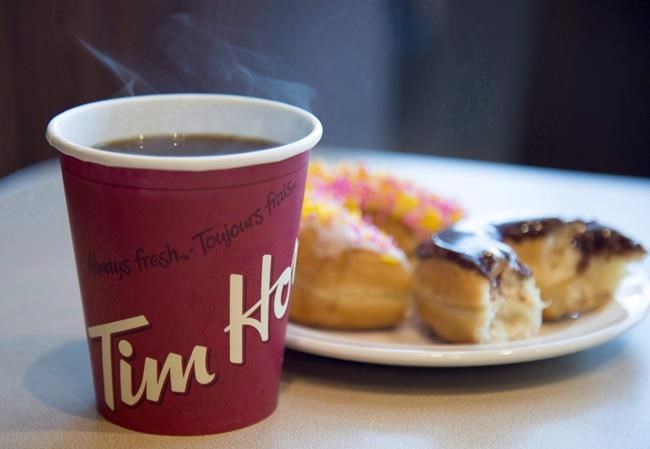TORONTO — The CEO of Tim Hortons' parent company says the quick service chain generated sales in its latest quarter above pre-pandemic levels for the first time since the onset of COVID-19, but the business is still being affected by a slower return to offices in regions like Toronto.
"More offices reopened in the second quarter and people are coming back to hybrid capacity, but downtown Toronto is just getting back to work," said Restaurant Brands International CEO José Cil, on a Thursday call with analysts.
"They're still down high teens in terms of performance from a sales standpoint for some of the restaurants, so mobility in the downtown corridor is still a work in progress."
Cil's remarks come as restaurant operators and other hospitality businesses are plotting a rebound from the pandemic, which forced many to close their doors, pare back their store counts and face lower sales.
Quick service restaurants, including RBI's Burger King, Popeyes Louisiana Kitchen and Firehouse Subs, were particularly affected because many people were no longer commuting to workplaces and thus, stopped making coffee runs on their way to the office or on breaks.
But in recent months, companies have demanded their staff head back to workplaces and consumers are falling into old habits like buying lunch or coffee meetings.
They're being met with a slew of new products RBI has released at Tim Hortons like a second collaboration with Justin Bieber that took the form of a French vanilla cold brew called Biebs Brew.
Other new additions include cilantro lime and habanero chicken wraps and loaded bowls, which Cil said drove improvements in performance measures linked to younger customers and have re-engaged others that tend to frequent the business' chains for breakfast and snacks only.
As a result, RBI has seen sales grow 14 per cent in the second quarter, although they were down compared to the same time in 2021.
The company, which keeps its books in U.S. dollars, says global system-wide sales were up nearly US$1 billion year-over-year to over US$10 billion, with digital sales growing by double-digits over the same period.
Topping these results could prove tough for RBI, if a rumoured recession materializes.
Cil has yet to see the near 40-year high inflation level impact consumer habits, but said the company is ready to face economic pressures.
"We recognize the uncertain and, at times, difficult environment that we're facing as a result of ongoing commodity and wage inflation, rising interest rates and broader macro uncertainties impacting our industry and many others," said Cil.
"While many of these pressures are out of our control, we've been focused on working closely with our franchisees to take thoughtful action to alleviate those within our and our franchisees' control."
Those actions include providing franchisees with staffing and retention best practices, simplifying back-of-house processes and making training resources easy to follow.
As RBI undertook these efforts, its net income attributable to common shareholders totalled US$236 million or 76 cents per diluted share for the quarter ended June 30, down from US$259 million or 84 cents per diluted share a year earlier.
Revenue for the quarter totalled US$1.64 billion, up from US$1.44 billion in the same period last year.
On an adjusted basis, RBI said it earned 82 cents per diluted share in its latest quarter, up from an adjusted profit of 77 cents per diluted share a year earlier.
The results pushed RBI's share price up seven per cent or $4.78 to $75.36.
This report by The Canadian Press was first published Aug. 4, 2022.
Companies in this story: (TSX:QSR)
Tara Deschamps, The Canadian Press



